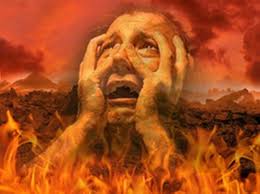All Your Pomp Has Been Brought Down to the Grave
14: 9-11
All your pomp has been brought down to the grave DIG: How different is this picture from the one where the antichrist ruled the earth? Is ADONAI a respecter of persons? Or as far as salvation is concerned, does He give equal opportunity to all (John 3:16)? Basically, the question becomes, “Is God fair?”
REFLECT: What is the pomp and noise of your harps that distracts you from living for that which is really important? How, exactly, did YHVH humble the king of Babylon to fulfill this prophecy? Why should you rejoice in the fall of the king of Babylon? Do you think the LORD rejoices in this? Why?
In the second of four stanzas, the soul of the king of Babylon enters into sh’ol. With an unquestionable feel for contrast, Isaiah moves us from the earth to the underworld. He shows us that the same event that brought rest and peace on the earth above (14:4-8), brought agitation and disorder to the world below. The antichrist is indeed the author of confusion, and causes chaos wherever he goes. The source of the agitation is the discovery on the part of the dead that the dreadful king who had ordered the death of many of them is, in fact, no different than they are. Although his glory had made him seem immortal, he must also succumb to corruption and decay.
The grave is pictured as a great throne room where the leaders and kings of the earth go when they die. The antichrist is envisioned as having died and is being met by the spirits of the departed, or the kings already in the grave. Amazed at the fate of this glorious king, whose splendor surpassed theirs, they were all astir. The antichrist thought he would rule the world, but he will merely be the first casualty of the Second Coming of Jesus Christ (Second Thessalonians 2:8).
Then there is a sudden surprise. When he dies, his soul enters sh’ol and sh’ol is stirred. The grave below is all astir to meet you at your coming; it rouses the spirits of the departed to greet you – all those who were leaders in the world (14:9a). The word for the dead (KJV) or spirits of the departed (NIV) means shades. In Hebrew, it literally means the powerless ones, the thin and shadowy personalities of the dead. Because death had destroyed the body and soul, the soul itself was but a half-life. The Jews believed that the realm of the unrighteous, unlike the righteous being at Abraham’s side (Luke 16:19-31), was a dusty, shadowy place where a dim reflection of the person lived on in inactivity (Job 7:9, 17:16, 26:6; Psalm 6:5, 31:17, 88:11-12, 115:17). Men and women still exist in hell but they are reduced to mere shadows. They have no more reality than that.
As the antichrist enters into the regions of hell everything stirs up. It makes them rise from their thrones all those who were kings over the nations (14:9b). When the mighty king appears, they suddenly rise up from their thrones as if to pay their respects, which one might expect if this was a normal lament. But instead of paying homage, they mock him by reminding him that the grave is the great equalizer.

They will all respond, they will declare: You also have become weak, as we are; you have become like us (14:10)? Did he also come here? He of all people? This startles even those who were kings on earth. They were surprised and astonished. Have you become just like us? They are shocked to learn that even this man is mortal. They continue their mocking by saying: All your pomp has been brought down to the grave, along with the noise of your harps; maggots are spread out beneath you and worms cover you (14:11). Isaiah describes his fate by declaring that maggots are spread out beneath you and worms cover you. His pride was nothing more than pretty trappings on a rotting corpse. The kings of the earth came out of the shadows to mock the antichrist, only to sink back into the darkness.
The TaNaKh looks forward and the B’rit Chadashah looks back. Therefore, the TaNaKh awaits Yeshua Messiah to meet the need for the resurrection of the body. Both unbelievers (see the commentary on Revelation, to see link click Fn – The Second Resurrection), and believers (see the commentary on Revelation Ff – The First Resurrection) will be resurrected. This demonstrates the progressive nature of the teachings of the Bible.
How wonderful that those who believe in Yeshua as their Lord and Savior will find that the grave has no hold on them, for someday we will be away from the body and at home with the Lord (2 Cor 5:8; Phil 1:21).



Leave A Comment